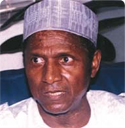Fresh facts have emerged as to why Nigeria decided to cooperate with the United States government on the idea of setting up an African Command on the African soil.
Strategic, economic interests that are futuristic by all accounts may have informed the decision by the Federal Government to extend its hand of fellowship to the American government towards the setting up of the United States Africa Command (AFRICOM).
Nigeria had earlier resisted the coming on board of the command on grounds that it was capable of impugning on its sovereignty with attendant security implications.
The Council of State, chaired by President Yar'Adua, had strongly voiced its opposition to the command. Thereafter, Foreign Affairs Minister, Chief Ojo Maduekwe, who was part of the President's delegation to the US, restated that Nigeria was not favourably disposed to the idea of the presence of US troops on African soil under the auspices of AFRICOM.
On the other hand, the US Department of Defense had said the command was being created to build the capacity of African partners in pre-empting conflict and for peace efforts' surveillance.
But after meeting with the US President George W Bush at the Oval Office two weeks ago, President Umar Musa Yar'Adua said Nigeria was willing to cooperate with the US on AFRICOM, stressing that the move was in the greater interest of the Nigerian nation and its people.
High level diplomatic sources confirmed to The Guardian in Abuja that Nigeria buckled under serious diplomatic pressure from the world's sole super power, "as part of a new understanding that can fence-off a likelihood of a gun-goat diplomacy that might be the end result of a long-drawn disagreement between the two countries on the matter."
Speaking on the Nigerian volte face, a senior Foreign Affairs source stressed yesterday that the Federal Government move is expedient giving the intractable security situation in the Gulf of Guinea and the complexity added to the militarisation of the Niger Delta.
The official said: "Nigeria had clearly become a borderline. It would be inadvisable to wait for a conflagration before taking what is generally known as progression action. The world is arranged in a hierarchical, anarchical order.
"So, as we fight the economic war, we must take cognizance of what our neighbours are planning and be on top of it. If we do not take care of that end, then they can harbour fifth columnists."
The official continued: "As we know it in government diplomacy, Condon Santire – the era of keeping even our enemies at bay rather than fighting them. Our borders should be zones of peace, not zones of belligerence.
"It is, however, envisaged that Nigeria will continue to review its current stand as other dynamics of international politics unfold. It is a strategic move. It was not a presidential fiat. All relevant government arms, including the intelligence wing, were consulted."
Observers also maintained at the weekend that the decision by Nigeria to cooperate with the American-sponsored AFRICOM was precipitated by the acceptance of Liberia to provide a military base for the take of the command in West Africa, whereas Nigeria is the leading regional power from whose benevolence, Liberia had severally basked.
Last month, the executive arm of government had sent a memo to the National Assembly on a proposal to forgive Liberia's debt. The move was interpreted as last minute carrots by Nigeria aimed at dissuading Liberia from providing a base for AFRICOM.
But when President Yar'Adua spoke on Nigeria's new position in Washington, he did not betray any of these strains. He maintained that security was uppermost on his mind.
The President said: "We have discussed on security issues; security within Nigeria, the Niger Delta, the Gulf of Guinea and peace and security on the African continent.
"We shall partner AFRICOM to assist not only Nigeria but also the African continent to actualise its peace and security initiatives. It is an initiative to have standby forces in each of the regional economic groupings in Africa."
The President did not give finer details of the discussion on AFRICOM, which include whether Nigeria will be used as the command's base. Experts, however, think that Nigeria's acceptance of the command is capable of influencing other African countries.
The romance between Nigeria and AFRICOMN is a clear departure from the leaning of earlier administrations, which the Yar'Adua government initially toed.
In the early sixties, the government of Alhaji Tafawa Balewa stridently resisted attempts by the withdrawing colonial powers to have a defense treaty with Nigeria. Defence treaties are conterminous with military bases.
Many times in the Second Republic, President Shehu Shagari rejected moves to have Nigeria militarily aligned with either the West or the then Soviet bloc.
And during the subsequent military regimes of Generals Muhammadu Buhari, Ibrahim Babangida, Sani Abacha and Abdulsalami Abubakar, Nigeria gradually consolidated on her aloofness to the idea while pursuing its medium-power course.
Greater cooperation in the military sphere was, however, resuscitated at the return of civilian rule in 1999.
The Olusegun Obasanjo administration had opened up the "friendship wing" of the Nigerian military, as the US government, following the visit of its Defense Secretary, William Cohen, announced that it was spending $10 million on the Nigerian military.
When the country's Under-Secretary (political affairs), Thomas Pickering, visited, it was again announced that the US would quadruple its support for Nigeria.
The support had since been expanded in year 2000 under the headings: spare and repair parts, technical library, instructor pilot training, maintenance (avionics & aircraft), classroom equipment as well as the broad idea of a Standard Simulation Centre.
From Oghogho Obayuwana, Abuja
The Guardian
Sunday, December 23, 2007



![[PRESS RELEASE] AFFIRMATION OF EMERGENCY RULE IN RIVERS STATE THROUGH “AYES AND NAYS”](https://www.nas-int.org/wp-content/uploads/2025/03/National-Assembly-Ayes-and-Nays-400x250.jpeg)
